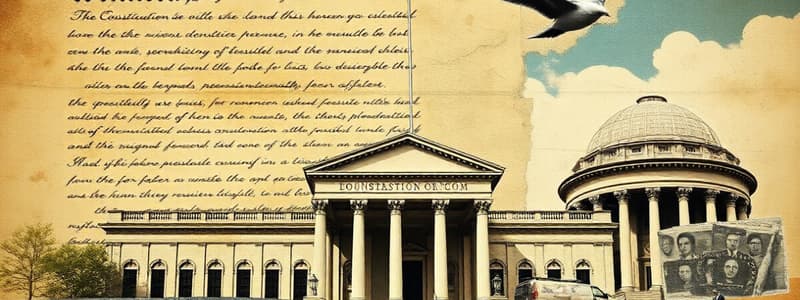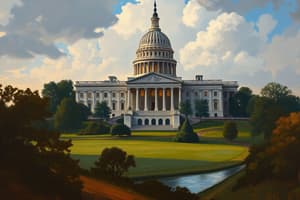Podcast
Questions and Answers
What was George Washington's role during the American Revolutionary War?
What was George Washington's role during the American Revolutionary War?
- He served as a British general.
- He commanded the Continental Army. (correct)
- He was a delegate to the First Continental Congress.
- He was the first Secretary of State.
What is meant by expressed powers in the U.S. Constitution?
What is meant by expressed powers in the U.S. Constitution?
- Powers that states can exercise independently.
- Powers specifically granted to the federal government. (correct)
- Powers that are implied but not explicitly stated.
- Powers reserved for local governments only.
Which clause provides the basis for implied powers in the federal government?
Which clause provides the basis for implied powers in the federal government?
- The Equal Protection Clause.
- The Establishment Clause.
- The Necessary and Proper Clause. (correct)
- The Supremacy Clause.
What are inherent powers of the national government?
What are inherent powers of the national government?
Which of the following is NOT an expressed power of the federal government?
Which of the following is NOT an expressed power of the federal government?
What type of powers are encompassed by delegated powers?
What type of powers are encompassed by delegated powers?
Which of these actions would be considered an implied power of the national government?
Which of these actions would be considered an implied power of the national government?
How do expressed powers help define the role of the federal government?
How do expressed powers help define the role of the federal government?
What problem did the Articles of Confederation pose regarding interstate commerce?
What problem did the Articles of Confederation pose regarding interstate commerce?
What is the function of the Court of Appeals in the federal court system?
What is the function of the Court of Appeals in the federal court system?
What change did the Constitution introduce regarding amendments?
What change did the Constitution introduce regarding amendments?
What type of cases do federal courts generally have jurisdiction over?
What type of cases do federal courts generally have jurisdiction over?
Which opinion explains the Supreme Court's decision and sets a legal precedent?
Which opinion explains the Supreme Court's decision and sets a legal precedent?
What was lacking in the Articles of Confederation regarding the judiciary?
What was lacking in the Articles of Confederation regarding the judiciary?
What does appellate jurisdiction allow a court to do?
What does appellate jurisdiction allow a court to do?
How did the Constitution address the problem of military power under the Articles?
How did the Constitution address the problem of military power under the Articles?
What issue did the inconsistent currency among states create?
What issue did the inconsistent currency among states create?
What is the role of a dissenting opinion in the Supreme Court?
What is the role of a dissenting opinion in the Supreme Court?
How many justices currently serve on the Supreme Court?
How many justices currently serve on the Supreme Court?
What structural change did the Constitution make to the legislative branch?
What structural change did the Constitution make to the legislative branch?
What is the significance of judicial review established by Marbury v. Madison?
What is the significance of judicial review established by Marbury v. Madison?
What was a primary concern of Antifederalists regarding the Constitution?
What was a primary concern of Antifederalists regarding the Constitution?
What was the main goal of the Federalist Papers?
What was the main goal of the Federalist Papers?
Which circuit system exists within the federal Court of Appeals?
Which circuit system exists within the federal Court of Appeals?
What is the main purpose of the Bill of Rights concerning the federal government?
What is the main purpose of the Bill of Rights concerning the federal government?
Which of the following is a power that Congress holds regarding government spending?
Which of the following is a power that Congress holds regarding government spending?
Which statement accurately describes both the House of Representatives and the Senate?
Which statement accurately describes both the House of Representatives and the Senate?
What distinguishes House members from Senators in terms of their terms and focus?
What distinguishes House members from Senators in terms of their terms and focus?
What is one of the privileges enjoyed by members of Congress?
What is one of the privileges enjoyed by members of Congress?
How does a bill typically start its journey to becoming a law?
How does a bill typically start its journey to becoming a law?
Which of the following age and citizenship requirements are needed to be a Senator?
Which of the following age and citizenship requirements are needed to be a Senator?
What role does Congress play in the process of a bill becoming a law?
What role does Congress play in the process of a bill becoming a law?
What is the minimum age requirement to become U.S. President?
What is the minimum age requirement to become U.S. President?
What was the primary goal of the Connecticut Compromise?
What was the primary goal of the Connecticut Compromise?
How many electoral votes must a candidate secure to win the presidency?
How many electoral votes must a candidate secure to win the presidency?
Who were the Federalists, and what did they advocate for?
Who were the Federalists, and what did they advocate for?
Which of the following is NOT one of the President's constitutional powers?
Which of the following is NOT one of the President's constitutional powers?
Who is first in the Presidential Succession List after the Vice President?
Who is first in the Presidential Succession List after the Vice President?
What concerns did the Anti-Federalists have regarding the Constitution?
What concerns did the Anti-Federalists have regarding the Constitution?
James Madison is often referred to as the 'Father of the Constitution' primarily due to his role in:
James Madison is often referred to as the 'Father of the Constitution' primarily due to his role in:
What role does the Vice President serve in the Senate?
What role does the Vice President serve in the Senate?
What is required for a treaty to take effect?
What is required for a treaty to take effect?
What did the Federalist Papers aim to achieve?
What did the Federalist Papers aim to achieve?
Which is the primary function of the Cabinet?
Which is the primary function of the Cabinet?
Which statement accurately reflects the significance of the Connecticut Compromise?
Which statement accurately reflects the significance of the Connecticut Compromise?
What does the State of the Union Address typically involve?
What does the State of the Union Address typically involve?
Which of the following was a primary argument of the Anti-Federalists?
Which of the following was a primary argument of the Anti-Federalists?
What was the main compromise between large and small states regarding representation in Congress?
What was the main compromise between large and small states regarding representation in Congress?
Flashcards
Expressed Powers
Expressed Powers
Powers specifically granted to the federal government by the U.S. Constitution, clearly outlined in the document, such as regulating interstate commerce, coining money, and declaring war.
Delegated Powers
Delegated Powers
Powers assigned to the federal government by the U.S. Constitution, including both expressed and implied powers necessary to execute those expressed powers. This ensures key responsibilities like regulating commerce and conducting foreign relations are done at the federal level, not by individual states.
Implied Powers of the National Government
Implied Powers of the National Government
Powers not explicitly stated in the U.S. Constitution, but necessary for the government to carry out its expressed powers. Derived from the Necessary and Proper Clause, these powers allow the government to take actions essential to its constitutional duties, such as establishing a national bank.
Inherent Powers of the National Government
Inherent Powers of the National Government
Signup and view all the flashcards
George Washington
George Washington
Signup and view all the flashcards
Connecticut Compromise
Connecticut Compromise
Signup and view all the flashcards
Federalists
Federalists
Signup and view all the flashcards
Anti-Federalists
Anti-Federalists
Signup and view all the flashcards
James Madison
James Madison
Signup and view all the flashcards
Bicameral Legislature
Bicameral Legislature
Signup and view all the flashcards
House of Representatives
House of Representatives
Signup and view all the flashcards
Senate
Senate
Signup and view all the flashcards
Articles of Confederation
Articles of Confederation
Signup and view all the flashcards
What was a problem with the Articles of Confederation regarding trade?
What was a problem with the Articles of Confederation regarding trade?
Signup and view all the flashcards
How did the Constitution address the trade issue in the Articles of Confederation?
How did the Constitution address the trade issue in the Articles of Confederation?
Signup and view all the flashcards
What was the main challenge related to amending the Articles of Confederation?
What was the main challenge related to amending the Articles of Confederation?
Signup and view all the flashcards
How did the Constitution make it easier to amend than the Articles of Confederation?
How did the Constitution make it easier to amend than the Articles of Confederation?
Signup and view all the flashcards
Why was the lack of a national court system a problem under the Articles of Confederation?
Why was the lack of a national court system a problem under the Articles of Confederation?
Signup and view all the flashcards
How did the Constitution address the absence of a national court system?
How did the Constitution address the absence of a national court system?
Signup and view all the flashcards
What was a significant weakness of the Articles of Confederation related to national defense?
What was a significant weakness of the Articles of Confederation related to national defense?
Signup and view all the flashcards
How did the Constitution address the issue of national defense under the Articles of Confederation?
How did the Constitution address the issue of national defense under the Articles of Confederation?
Signup and view all the flashcards
District Court
District Court
Signup and view all the flashcards
Court of Appeals
Court of Appeals
Signup and view all the flashcards
Supreme Court
Supreme Court
Signup and view all the flashcards
Judicial Review
Judicial Review
Signup and view all the flashcards
Appellate Jurisdiction
Appellate Jurisdiction
Signup and view all the flashcards
Majority Opinion
Majority Opinion
Signup and view all the flashcards
Dissenting Opinion
Dissenting Opinion
Signup and view all the flashcards
Circuit
Circuit
Signup and view all the flashcards
What is the purpose of the Bill of Rights?
What is the purpose of the Bill of Rights?
Signup and view all the flashcards
How does Congress control government spending?
How does Congress control government spending?
Signup and view all the flashcards
What is the role of Congress in making laws?
What is the role of Congress in making laws?
Signup and view all the flashcards
What are some similarities between the House and Senate?
What are some similarities between the House and Senate?
Signup and view all the flashcards
What are the age and citizenship requirements for members of the House and Senate?
What are the age and citizenship requirements for members of the House and Senate?
Signup and view all the flashcards
What are the term lengths of House members and Senators?
What are the term lengths of House members and Senators?
Signup and view all the flashcards
How are members of the House and Senate elected?
How are members of the House and Senate elected?
Signup and view all the flashcards
Describe the process of a bill becoming a law.
Describe the process of a bill becoming a law.
Signup and view all the flashcards
What is a pardon?
What is a pardon?
Signup and view all the flashcards
What are treaties?
What are treaties?
Signup and view all the flashcards
Who is an ambassador?
Who is an ambassador?
Signup and view all the flashcards
What is the Cabinet?
What is the Cabinet?
Signup and view all the flashcards
What is the federal bureaucracy?
What is the federal bureaucracy?
Signup and view all the flashcards
Who are political appointees?
Who are political appointees?
Signup and view all the flashcards
What is the President's role as Legislative Leader?
What is the President's role as Legislative Leader?
Signup and view all the flashcards
What are the President's Constitutional Powers?
What are the President's Constitutional Powers?
Signup and view all the flashcards
Study Notes
American Government Review
- Government is the governing body of a nation, state, or community.
- Limited government restricts the government's power by laws or a constitution to protect individual freedoms.
- Popular sovereignty is the principle that government's authority comes from the consent of the people.
- Checks and balances divides governmental powers among branches (executive, legislative, and judicial) to prevent any one branch from becoming too powerful.
- Federalism divides power between national and smaller political units (states or provinces).
- Judicial Review is the power of courts, especially the Supreme Court, to determine the constitutionality of laws and government actions.
- Separation of powers divides governmental functions and responsibilities among three distinct branches (executive, legislative, and judicial).
- A republic is a form of government where power is held by elected representatives instead of a monarch.
- An amendment is a formal change added to a legal document, like the U.S. Constitution.
- A confederacy is a union of independent states working together for specific purposes while maintaining their sovereignty.
- A bicameral legislature has two separate chambers (houses).
- The Articles of Confederation was the first constitution of the U.S., establishing a weak central government and giving states significant power.
- Motivations for British colonization included economic gain, expansion of territory, religious freedom, and strategic interests.
- The Declaration of Independence declared the thirteen American colonies independent from British rule, asserting unalienable rights to life, liberty, and the pursuit of happiness.
- Weaknesses of the Articles of Confederation included a lack of central authority and the inability to regulate commerce.
- Successes of the Articles of Confederation included the Northwest Ordinance and the successful conduct of diplomacy.
- The Connecticut Compromise (Great Compromise) established a bicameral legislature, balancing representation by population in the House of Representatives and equal representation in the Senate.
- Federalists advocated for a strong central government, believing it would ensure order and address the weaknesses of the Articles of Confederation.
- Anti-Federalists opposed a strong central government, fearing it would infringe on individual liberties.
- Inherent powers are powers of the national government derived from its sovereignty (not explicitly in the Constitution).
- Powers denied to the national government are those specifically prohibited by the Constitution.
- Reserved powers are those not given to the federal government and are held by the state governments.
- The Federalist Papers were a series of essays written to promote the ratification of the U.S. Constitution.
- The Necessary and Proper Clause (Elastic Clause) allows Congress to make laws necessary to carry out its enumerated powers.
- Ratification is the formal approval process for laws, amendments, or treaties.
- Rights are entitlements or freedoms granted to individuals, often protected by law or moral principles.
- State sovereignty is the authority of individual states to govern themselves independently.
- Concurrent powers are those shared by both the federal government and state governments.
- The Supremacy Clause establishes that the U.S. Constitution, federal laws, and federal treaties are the supreme law of the land.
- The Preamble to the Constitution outlines the goals and purposes of the U.S. government.
- Unalienable rights are fundamental rights that cannot be taken away or denied.
- The social contract is a philosophical concept describing an implicit agreement among individuals to form a government.
- The different forms of government include democracy, republic, monarchy, authoritarianism, totalitarianism, theocracy, and oligarchy.
Studying That Suits You
Use AI to generate personalized quizzes and flashcards to suit your learning preferences.




